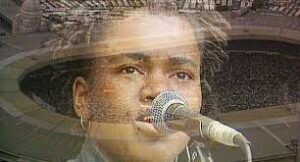“Fast Car” Reminds Us That Our Memories Are Ours

Tracy’s Chapman’s eponymous album is one of my first memories of music. It is a masterpiece musical tapestry that pulls me into different worlds for the duration of each song. Even the songs that are heartbreaking have a haunting pull to them. She tells these stories with empathy, love, and a glimmer of hope that if we tell enough of these stories, we can change them.
By all accounts I’ve read, it seems like Chapman didn’t expect to achieve such worldwide fame when she was discovered playing at a coffee shop as a college student. Her songs were just her ideas, observations, and memories. “Fast Car” was the last song recorded for her studio album. Initially her label wanted her to cut the song down. But Chapman fought to make sure the whole story was included. I wonder if as she was recording this song in its full authenticity, she was realizing how far she would go. The song has that energy.
35 years after Chapman’s original song was released, it is back in rotation, charting in the Billboard top 10 again, sung in new voice. A surprising at first, but not-so-surprising-once-you-think-about-it-more voice: country star, Luke Combs. Like me, Combs grew up in North Carolina. Like me, he grew up driving all around the sprawl of our state listening to “Fast Car.” And like me, it’s pretty much his favorite song.
As people celebrate this song again, it is clear how this song evokes precious formative memories for so many people around the world. This NPR music reviewer shares more about what it’s like to hear Combs revisit this song. This song is both uniquely experienced, interpreted, and remembered, but it also unifies everyone who loves it.
As a relationship therapist, I have worked with many versions of the song’s beautifully told, tragically common story. It’s the story of family of dysfunction repeating. The “narrator” watches her mom leave. Then feels bound to make major sacrifices to help her substance-abusing father, until she realizes that her efforts are futile. In the boldness of youth, she escapes with someone who has a fast car. The chorus is jubilant. You can feel the wind in her hands, the freedom, and the release. Then we are back to the reality that the narrator is bound again to a bleak situation. The family pattern has repeated. Her partner* is drinking and not working, just like her father. She has dreams, but no support for them. (*Note: I combed through the lyrics of each song on this album. Not a single song states the gender of any of the partners she refers to. Chapman is famously private about her personal life.)
The end of the story is up for interpretation. Two big clues towards the end are the line, “take your fast car and keep on driving.” And the final line, “leave tonight or live and die this way.” Is she singing to herself? Or is she singing to desperately reinspire her partner* to take action towards a better life? If the later, is she successful? Given Chapman’s other stories of “ride or die” relationship choices, it isn’t far-fetched that this narrator sticks with her partner. Maybe they work it out and her partner steps up.
But I like to imagine she leaves. The last verse is sung to herself. Not like I enjoy watching people break up. But I do enjoy seeing people free themselves. I like the idea that this is a story of someone breaking a cycle. In this interpretation, I like how she treats her memory depicted in the initial chorus. The memory is hers. Even if she has many bad memories with her partner after, they cannot take this happy memory away from her. In fact, she uses it as inspiration to get away from them. She does not have to block the memory just because they are in it. Eventually they fade and she remembers the most important part of the memory, “I-I had the feeling I could be someone, be someone.” In this interpretation, she drives off in here very own car.
“Epilogue”
As I was looking for a picture of Chapman to post with this blog, I found a picture attached to an article suggesting that this song was inspired by her mothers’ story. Chapman’s parents divorced when she was a young child, and she was raised by her mother. If this song is telling her family history, it sounds like her mother broke a family cycle, and that helped Chapman to became the conscientious human and rockstar she is today.
Additional note: The picture I ended up using is from her performance heard round the world in 1988 at the Nelson Mandela 70th Birthday Tribute. Her performance slot was bumped to a prime-time televised position when Stevie Wonder’s technology failed and he couldn’t go on.
